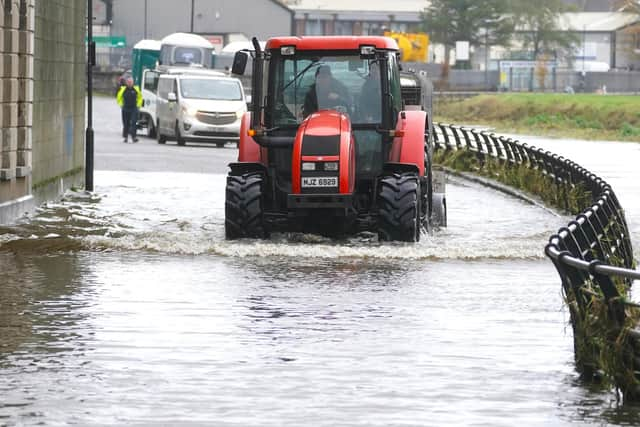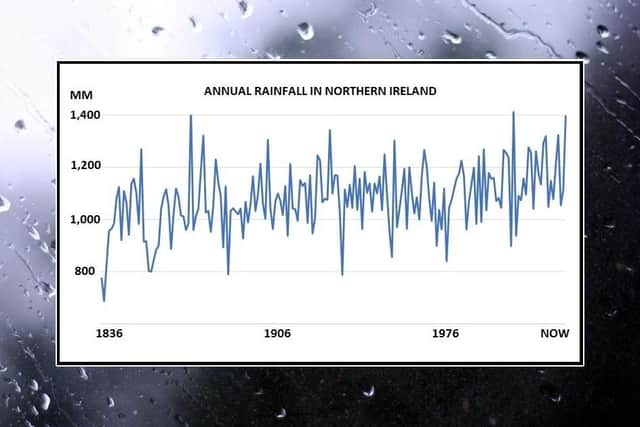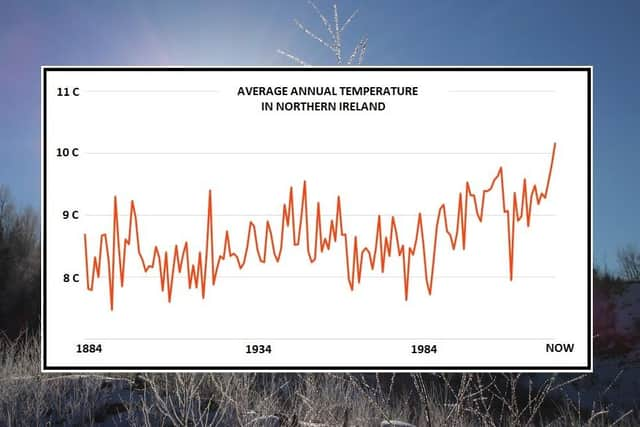Big rise in number of insurance claims from flooded Northern Irish farms amid escalating warmth and rainfall attributed to climate change
and live on Freeview channel 276
The insurer gave no precise numbers, but told the News Letter such claims have increased "each year since 2020", including a doubling in the number of claims from 2022 to 2023 (albeit from a relatively low base).
This is despite the absence of what it calls "wide-scale flooding events" in that period – that is, massive, catastrophic cases of flooding.
Advertisement
Hide AdAdvertisement
Hide AdA spokesman for the firm indicated that the rise is instead being driven by more smaller, localised floods.


NFU Mutual made the comments in the wake of new figures from the Met Office showing that 2023 was the third wettest year on record for the Province, and the hottest overall.
The News Letter has now also obtained the full figures for annual rainfall and average annual temperature in Northern Ireland going back as far as records exist, and has plotted them onto graphs which show an unmistakable, long-term upward trend in both.
“With 2023 one of the warmest and wettest on record in Northern Ireland, NFU Mutual is preparing for more severe weather in the future, with an increase in floods, storms and heatwaves likely across the UK," said David Harrison, a farming specialist at the firm.
Advertisement
Hide AdAdvertisement
Hide AdHe said "isolated rural dwellings and businesses are most at risk of extreme weather" adding that "we urge farmers to have a flood plan in place, detailing roles and mitigations should the worst happen, and plan to move vulnerable stock, machinery and livestock to higher ground".


He said that NFU Mutual customers can receive a contribution, above and beyond the cost of repairing damage, towards making "flood-resilient repairs" like moving plug sockets.
He added: “An increase in severe weather could also increase the risk of hot, dry periods causing fires.
"Although the number of farm fires in Northern Ireland decreased in 2022, they still cost £4.2 million, and scientists are predicting a rise in extremely hot and dry periods of weather."
Advertisement
Hide AdAdvertisement
Hide Ad• UFU chief: ‘2023 one of our most turbulent’ •


Meanwhile UFU president David Brown told the News Letter: “Last year was one of the most turbulent, weather-related years on record.
"The weather has a huge impact on a farm business which then has a domino like effect on a farm family’s income and food supply.
“The wettest July on record made headline news, but what was not highlighted was that due to the unseasonably wet ground conditions, livestock were housed much earlier than usual.
"The animals had to be fed bought-in feed or in some cases, silage was opened early adding additional cost and pressure for farmers. At the same time, feed and fertiliser prices remained at record levels.
Advertisement
Hide AdAdvertisement
Hide Ad“Severe flooding was a major blow for growers in counties Down, Armagh and Antrim, particularly in the latter half of the year with many crops being damaged.
"Whatever produce did survive, its quality would have been impacted. Farmers put a huge amount of investment into producing a premium crop and are now trying to manage a serious financial hit.
“Unpredictable weather patterns affect everyone, but in particular, our farmers are at the forefront of a changing climate.”
Scientists are overwhemingly convinced that human actions - burning fossil fuels in particular - are driving the rise in the planet's overall temperature, by increasing the proportion of the greenhouse gas carbon dioxide.
Advertisement
Hide AdAdvertisement
Hide AdThough it makes up just a tiny fraction of the air (about 0.04%), NASA says its concentration has increased by about 50% compared to the days before the Industrial Revolution.
• Looking to the immediate future though, there are reasons for optimism: the Met Office is predicting very limited rain cover over Northern Ireland at the weekend, giving way to virtually none on Monday and Tuesday.
Midday temperatures are likely to be about 7C on Saturday, dropping to perhaps 5C or 6C on Sunday, with the clear skies of Monday and Tuesday causing the temperature to dip to perhaps 4C or so.